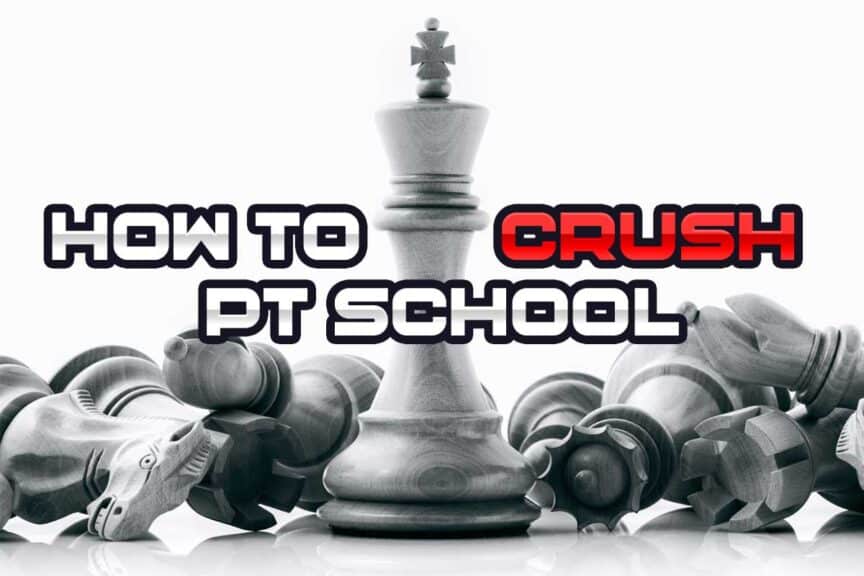Hard work works. Trust me on that. Also, trust me on this: Getting off to a strong start and maintaining excellence throughout PT school is WAY easier, more enjoyable and enriching than struggling right out of the gates and constantly fighting to keep your head above the water and your butt in the program.
If you want to do well in PT school – to own it and maximize all you can get out of it, there are five key principles that you need to follow right from day one in the program. If you commit to these principles and see them through, your performance in school will likely be significantly and undeniably better.
The five principles I outline within this article are all principles that I volitionally put into action from my first day in PT school. By all accounts, if you were to look at my undergraduate transcripts and knew my struggles to get INTO PT school, I would be destined to be a mediocre-at-best student in PT school.
But, I was out for blood. My hunger to become a PT is something I never could have described, and as a result I owned PT school…and YOU can to.
A quick overview of the principles to implement for dominating PT school:
Principle 1: Respect the program (it all begins with taking this seriously)
Principle 2: Be pre-emotive with all aspects of your studies
Principle 3: There’s nothing wrong with struggling, but there’s everything wrong with not fighting back
Principle 4: Your professional career starts in school – not when you enter clinical practice
Principle 5: Keep the big picture in mind: The sacrifice and grind won’t last forever
Respect the program: It all begins with taking PT school seriously
No matter how strong of an academic you are, you need to give this program the respect it deserves. There’s a lot of concepts and information you will need to learn, and if nothing else, you will likely stay very busy for the next three years. Your mentality should be that the second you disrespect the concepts and volume of material, you will be caught off-guard.
I saw so many of my peers in my cohort and the cohort beneath mine get burned from not respecting the program. By “respecting the program” I mean not being good with their time-management skills, not putting in the required time to study concepts, not completing assignments on time, and so on. You won’t be able to get away with it for too long before the lack of respect is reflected by your exam scores or assignment grades. Things can come quick and heavy in PT school.
This is not to say that you need to live in constant anxiety throughout the program. I want you to have confidence, and you can (and should) so long as you remember that there is a lot riding on school (tuition fees, your future career, etc.). You therefore need to always think of your PT curricula as a worthy opponent whom you’ve stepped into the ring with. Even if things are coming easy, you need to remember that one lucky hit by the opponent can be a game-changer.
Always enter the ring like a lamb and leave like a lion – never the other way around.
PT school is the same way.
Respecting the program begins by knowing when to say “no”
One of the greatest ways you can show respect to the program and to yourself is learning to say “no” (i.e. making sacrifices) in order to ensure that you get your study time in and don’t fall behind on assignments and projects.
If you think of a fighter training for a big fight, they know that even the weakest opponent can deliver a knockout blow if they don’t keep their guard up. Taking your opponent seriously means you have to train regularly, even when you may not feel like it. Studying and staying on top of things in PT school is the same way – at times you’ll need to say “no” to other activities or events that you’d like to be doing. Working hard is what you signed up for.
Respecting your money as a PT student
You are paying a pretty penny or two in tuition fees for each and every course that you take in PT school. You are likely putting yourself into a lot of student loan debt in order to make this program happen, and while the sting of loans doesn’t hurt too much while you’re in school, you’ll feel the sting when it comes time to repay them, trust me.
If you want to make that sting even worse, all you have to do is give lousy, sub-par efforts in each and every one of your courses. You’re likely paying somewhere between $500 – $1,000 dollars for each and every CREDIT that you’re taking, and not getting every ounce of learning opportunity out of those courses de-values your experience and learning potential. Yes, you’ll take some garbage courses in PT school that are a waste of time and money, which feels like a slap in the face, but I implore you to still give your best efforts and respect the money that you’re spending.
Be pre-emptive with all aspects of your studies as a student
If you’re serious with wanting to do as good as possible with PT school, you’re not going to sit around and wait until each course begins in order to start researching what you’re going to need to know for those courses. Rather, if you’re serious you’ll start organizing yourself and the general material for each course before it even starts.
Now, I’m not saying you need to start learning the individual material and concepts for each and every course just yet. But if you’re committed to ensuring that you minimize the risk of struggling and falling behind once classes start, you’d be wise to take some time before each course actually begins to discover the concepts and material that you’ll be going over for each of those courses.
Why is this important? Because any chance you give yourself to be further prepared and ready to rock and roll with upcoming material can pay massive dividends as a result. You’ll gain confidence with knowing what you’re up against, feel like you’ve got a strong sense of control and you’ll be much mor time-efficient when it comes time to learning the material in those courses.
There’s nothing wrong with struggling in PT school, but there’s everything wrong with not fighting back
PT school can be a grind on multiple fronts, regardless of how prepared you are or how seriously you’re committed to doing well. Think it not strange if at some point you find yourself doing all that you can and are still having a hard time with school in some sort of way. One of the worst things you could do is to subscribe to the belief that hard work and preparation on all fronts will guarantee an absence of struggle while in school.
Your chances of struggling will certainly minimize, but there are never any guarantees. The good news is that struggle can be what defines us. How you choose to respond to struggle says more about you than not struggling at all.Strength is built through struggle. It’s not fun, but getting stronger is a beautiful reward we receive when we fight through challenge. Hoping to go into PT school without facing any challenges is not only highly unrealistic, it will also rob you of potential growth.
Take the attitude of embracing struggle when you come up against it in any way, shape or form throughout PT school. Struggle is a great teacher and provides valuable lessons along with opportunities for growth that can’t TRULY be learned any other way. Just remember, if PT school were easy and simple, then everyone would do it.
Your professional career starts in PT school – not when you enter clinical practice
One of the biggest possible mistakes that you could ever make when heading into PT school is to believe that your professional career has yet to begin. While you won’t be treating patients on your own until you’ve graduated and been licensed, you need to have the mentality of your professional career beginning on your first day of classes.
How you act, carry yourself and represent the profession of PT needs to be actively pursued and developed while in school. A professional career is about more than just academic knowledge; a professional career consists of the ability to act responsibly, take ownership and present yourself in a way that exudes the characteristics of being a dependable individual.
Your ability to communicate effectively, work with others and do so in an appropriate manner is the backbone to professionalism. And in case you’re unaware, these are all things that you can actively employ and further develop throughout your time in PT school.
Not only do you become a better student on every front possible when you work on your professionalism throughout school, but you also set yourself up for a much better entry into clinical practice once you receive your professional license.
In other words, if you develop a professional demeanour in school, you can hit the ground running the second you enter into professional clinical practice. And while continuing your professional excellence is a lifelong pursuit, beginning to employ it and develop it throughout your three years of PT school will serve you well both in the classroom and in the clinic thereafter.
If you’re wondering how you can begin to get a great jumpstart on your professionalism, I would recommend starting with learning the Core Values of the American Physical Therapy Association (APTA), which you can find by clicking this link to learn all about the core values of the association.
Another great page to check out is the APTA’s page on self-assessment for multiple facets of core-values. This is a solid resource to look through when learning all about core-values relating to professionalism within the field of physical therapy.
Keep the big picture in mind: The sacrifice & grind of school won’t last forever
The days of PT school will seem long at times and tend to grind on and on and on. If (or more like when) you feel this to be the case, remember that the grind won’t last forever.
One of the best pieces of advice I ever received was that you can get through anything when you know when the end will arrive. This is very true, and I can attest to it firsthand as my spirits wore weary in the late days of PT school. For me, my spirits wore weary not from academic challenge but rather from just desperately longing to get into clinical practice and get my life back to a more normal rhythm. But what always made it easier – what always gave me the extra push in times of fatigue – was remembering that I knew what the end-date on the calendar was.
Just holding onto the big picture and the end-date can make all the difference in times of mental fatigue. When you DON’T know when the end of an unpleasant situation will come, it can be a rather defeating or discouraging feeling. When you DO know when it will all be over, whether it’s in another three weeks or three years, that certainty will give you an anchor point you can cling to for added strength. And since you know the day in which you’ll walk across the stage, you can certainly get through all the days in-between now and then.
You don’t have to enjoy every single day or every single experience in PT school. PT school is no different than life itself – highs and lows, but you just got to press on in good faith knowing that it’s all for a good cause. Keep this all in mind if you get weary at any point throughout school.
Concluding remarks
You CAN do good and perform well in PT school, even if you’re rather nervous or don’t feel like you’re the strongest academic student. Yes, it’s easier for some students than others, but just having the desire to do well and see it through by utilizing principles that help ensure success will take care of a substantial portion of the battle.
Of course, there’s more steps that you can take than the principles I’ve outlined within this article, but starting with these specific ones will certainly give you a leg up on any of your fellow peers who are’t as serious about dominating PT school as you are.
Remember, everyone’s journey is different and it’s not about comparing yourself to anyone else along the way. It’s all about telling yourself that you want to do as well as you possibly can, and then following through on that desire. Following through simply refers to implementing any strategies and principles that you can that will help ensure that this happens. I’m proof that with average intelligence backed up by hard work that you can own PT school and set yourself up for an amazing career thereafter.
Breathe deep. Grind hard. You’ve got this.
Related articles:
- What is Physical Therapy School Like? Answers to Commonly Asked Questions
- PT School: How to Know if You Should Work a Job While in School
- How to Prepare for PT School: Five Smart Steps to Take
- How PT Students Can Manage and Reduce Stress in School
- Six Study Tips for PT Students That Work for ANY PT Course

Hi! I’m Jim Wittstrom, PT, DPT, CSCS, Pn1.
I am a physical therapist who is passionate about all things pertaining to strength & conditioning, human movement, injury prevention and rehabilitation. I created StrengthResurgence.com in order to help others become stronger and healthier. I also love helping aspiring students and therapists fulfill their dreams of becoming successful in school and within their clinical PT practice. Thanks for checking out my site!


